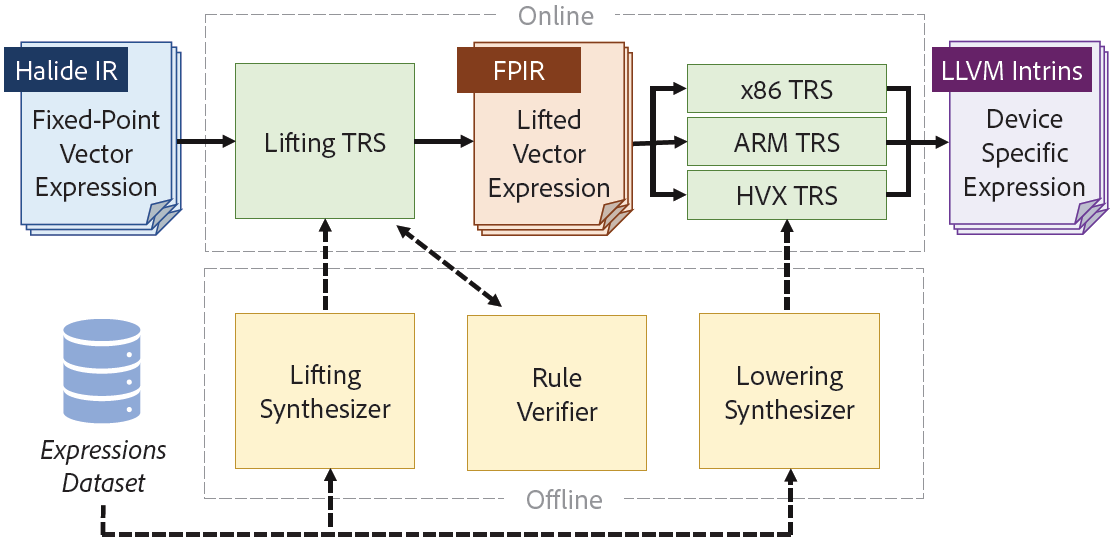Fast Instruction Selection for Fast Digital Signal Processing
Alexander J Root, Stanford University
Maaz Bin Safeer Ahmad, Adobe Research
Andrew Adams, Adobe Research
Shoaib Kamil, Adobe Research
Jonathan Ragan-Kelley, MIT CSAIL

Abstract
Modern vector processors support a wide variety of instructions for fixed-point digital signal processing. These instructions sup- port a proliferation of rounding, saturating, and type conversion modes, and are often fused combinations of more primitive op- erations. While these are common idioms in fixed-point signal processing, it is difficult to use these operations in portable code. It is challenging for programmers to write down portable integer arithmetic in a C-like language that corresponds exactly to one of these instructions, and even more challenging for compilers to recognize when these instructions can be used. Our system, Pitch- fork, defines a portable fixed-point intermediate representation, FPIR, that captures common idioms in fixed-point code. FPIR can be used directly by programmers experienced with fixed-point, or Pitchfork can automatically lift from integer operations into FPIR using a term-rewriting system (TRS) composed of verified man- ual and automatically-synthesized rules. Pitchfork then lowers from FPIR into target-specific fixed-point instructions using a set of target-specific TRSs. We show that this approach improves run- time performance of portably-written fixed-point signal processing code in Halide, across a range of benchmarks, by geomean 1.31x on x86 with AVX2, 1.82x on ARM Neon, and 2.44x on Hexagon HVX compared to a standard LLVM-based compiler flow, while maintaining or improving existing compile times.
Article
ACM Digital LibraryCode
Code is publicly available here.
BibTeX
@inproceedings{root2023pitchfork,
author = {Root, Alexander J and Ahmad, Maaz Bin Safeer and Sharlet, Dillon and Adams, Andrew and Kamil, Shoaib and Ragan-Kelley, Jonathan},
title = {Fast Instruction Selection for Fast Digital Signal Processing},
year = {2024},
isbn = {9798400703942},
publisher = {Association for Computing Machinery},
address = {New York, NY, USA},
url = {https://doi.org/10.1145/3623278.3624768},
doi = {10.1145/3623278.3624768},
abstract = {Modern vector processors support a wide variety of instructions for fixed-point digital signal processing. These instructions support a proliferation of rounding, saturating, and type conversion modes, and are often fused combinations of more primitive operations. While these are common idioms in fixed-point signal processing, it is difficult to use these operations in portable code. It is challenging for programmers to write down portable integer arithmetic in a C-like language that corresponds exactly to one of these instructions, and even more challenging for compilers to recognize when these instructions can be used. Our system, Pitchfork, defines a portable fixed-point intermediate representation, FPIR, that captures common idioms in fixed-point code. FPIR can be used directly by programmers experienced with fixed-point, or Pitchfork can automatically lift from integer operations into FPIR using a term-rewriting system (TRS) composed of verified manual and automatically-synthesized rules. Pitchfork then lowers from FPIR into target-specific fixed-point instructions using a set of target-specific TRSs. We show that this approach improves runtime performance of portably-written fixed-point signal processing code in Halide, across a range of benchmarks, by geomean 1.31x on x86 with AVX2, 1.82x on ARM Neon, and 2.44x on Hexagon HVX compared to a standard LLVM-based compiler flow, while maintaining or improving existing compile times.},
booktitle = {Proceedings of the 28th ACM International Conference on Architectural Support for Programming Languages and Operating Systems, Volume 4},
pages = {125-137},
numpages = {13},
location = {Vancouver, BC, Canada},
series = {ASPLOS '23}
}
